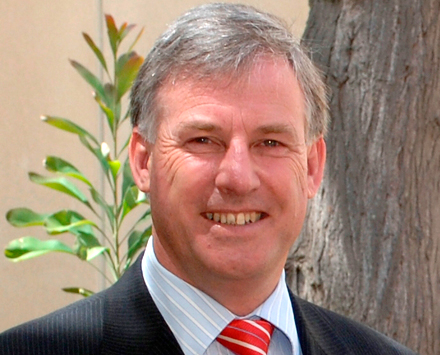
Senator Richard Colbeck
The Federal Government will provide $500 million in low interest loans to plantation growers if it is re-elected as part of its plan to dramatically expand plantations in Australia. However, the Government’s backtracking on allowing farm forestry and plantations full access to the Emissions Reduction Fund has been strongly criticised by the ALP, which has vowed to drop the strict water rule that disadvantages new tree plantings. Source: Philip Hopkins for Timberbiz
The issues were a focal point of a debate in Launceston last week between the Assistant Minister for Agriculture, Senator Richard Colbeck, and the ALP’s shadow minister for Agriculture, Fisheries and Forestry, Joel Fitzgibbon. The debate was organised by the Australian Forest Products Association.
Senator Colbeck, launching the $500 million low interest loan policy during the debate, said the money would be made available to industry through the Regional Investment Corporation to help plant more trees.
Senator Colbeck said the half a billion dollars would go a long way to ensuring the industry’s aim of planting one billion trees by 2030 and having “the right trees in the right place”.
“We estimate the amount will plant 150,000ha of trees from the $500 million. We will work with businesses who want to grow their estates so that amount can be taken up,” he said.
The AFPA had previously criticised the Government’s $20 million forestry plan, launched last year, as not providing enough money to realise the program to plant 400,000 hectares of new plantations by 2030.
Mr Fitzgibbon said the Government’s answer to all problems was a concessional loan.
“In 2013, we introduced farm concessional loans for people who are indebted. This Government turns them into everything,” he said.
These loans at a concessional rate had “no number” in a low interest rate environment. “Raising capital is not the key challenge for people who make the investment – the investment hurdle is. The Government borrows at the bond rate and issues the concessional loan at something above the bond rate. Thus, it does not cost much money, and allows them to say 500 million is on the table.”
Mr Fitzgibbon said no one knew what the Regional Investment Corporation is. It was called the ‘Barnaby Bank’, (after Barnaby Joyce) and was based in Orange, trying hard to give other concessional loans to farmers and water infrastructure grants.
“It has not done one water infrastructure grant and can’t do the concessional loans. Its strike rate is now 10%, it’s dysfunctional – a room full of public servants. I fear if Richard is re-elected and this loans program is handled by the RIC, be very scared by that proposition,” he said.
Senator Colbeck said Mr Fitzgibbon’s claim was a very unfair characterisation of an organisation that was established on first of July last year.
“To characterise them that way, is a pretty shabby to attack the good people on the board and administering the organisation,” he said.
Mr Fitzgibbon said the biggest impediment to plantation investment was the “ridiculous water rule”. This stipulates that any land with rainfall of more than 600 millimetres is ineligible for carbon credits. Industry relies on regions with 700 millimetre-plus rainfall to produce economic trees and wood of the right quality and species.
Mr Fitzgibbon said the water rule effectively meant there were no carbon offsets “unless you are trying to grow trees where it does not rain”.
“That is gone. There will be no review. We will get jobs and investment going,” he said, immediately setting up 13 regional forestry hubs for plantings and processors supported by the right infrastructure.
Labor’s policy on forestry hubs includes surveying forestry resources on private land to assess the potential wood supply for further processing, and opportunities for expanding farm forestry, private native forestry and indigenous forestry.
Mr Fitzgibbon said the Government was split on the water issue. The Minister for Agriculture, David Littleproud, had described the removal of the water rule as “reckless”, yet Senator Colbeck had urged the removal of the artificial rainfall barriers in the ERF, he said.
Senator Colbeck replied that regarding the water rule, “there is no question about my view of the world, it’s public”.
“We will continue that process around the water rule,” he said.
Timber processor James Neville Smith queried whether the concessional loans would be available to the native forest sector for capital investment into value-adding.
“We’re reduced to point where it’s difficult to get funding for further capital because of the scale of our businesses. We need to get more value out of less product,” he said.
Senator Colbeck said this was the first time this issue had been raised with him in regards to native forestry.
“I’m happy to consider it,” he said. The issue of low interest concession loans was an industry request in a previous policy document.
Mr Fitzgibbon said industry had not asked him for concessional loans.
“We are happy to have that conversation. I have no idea where the concessional loans question came from,” he said.
One result of the debate was Senator Colbeck’s announcement that the South West Slopes area of NSW, around Tumut and Tumbarumba, would be immediately added to the list of initial regional forestry industry hubs.
The AFPA said it would analyse the $500 million low interest loan promise to assess its effectiveness.





